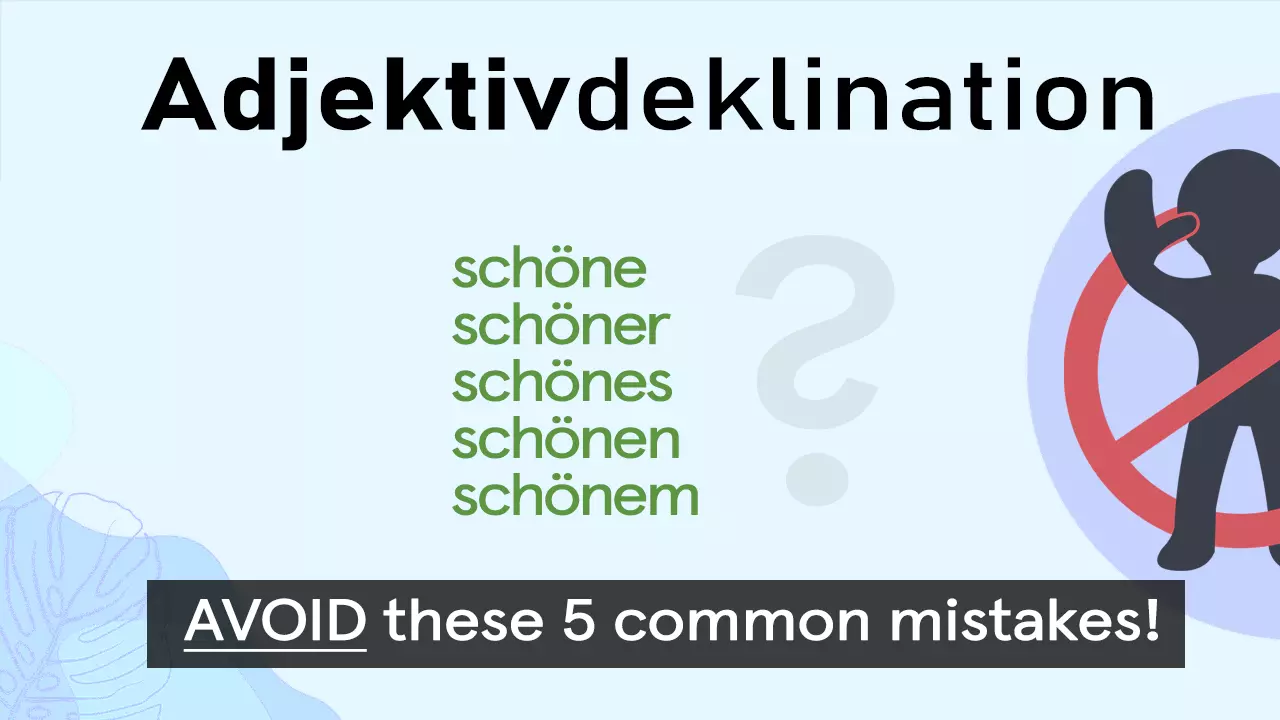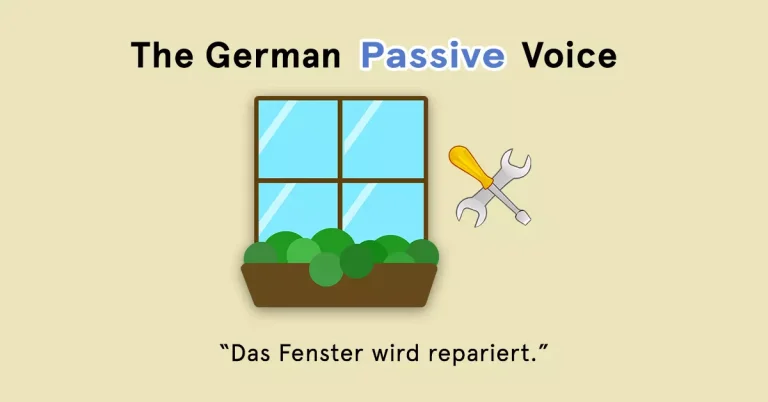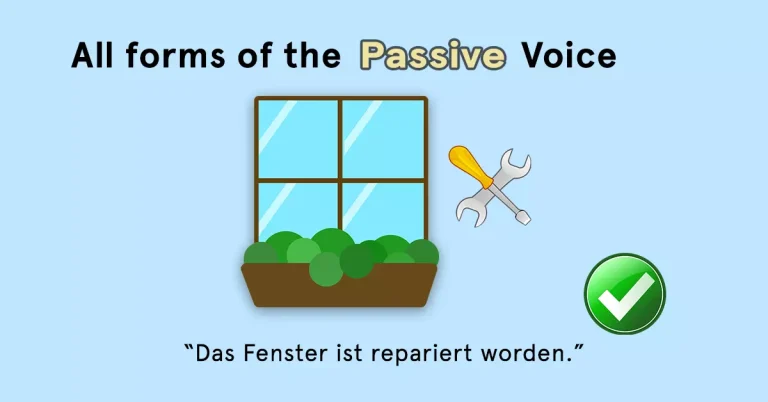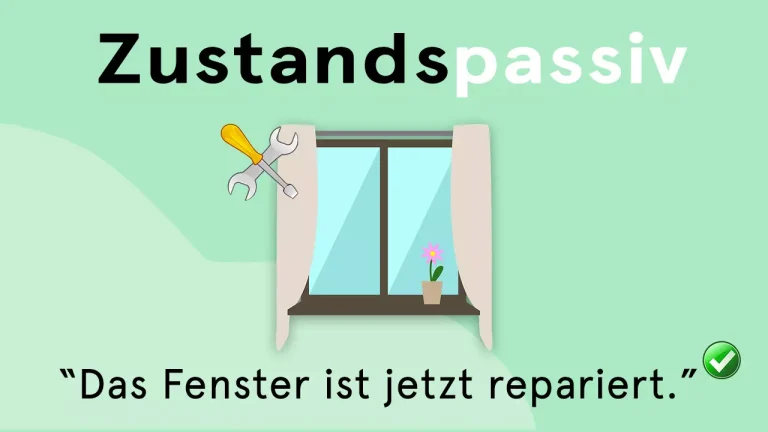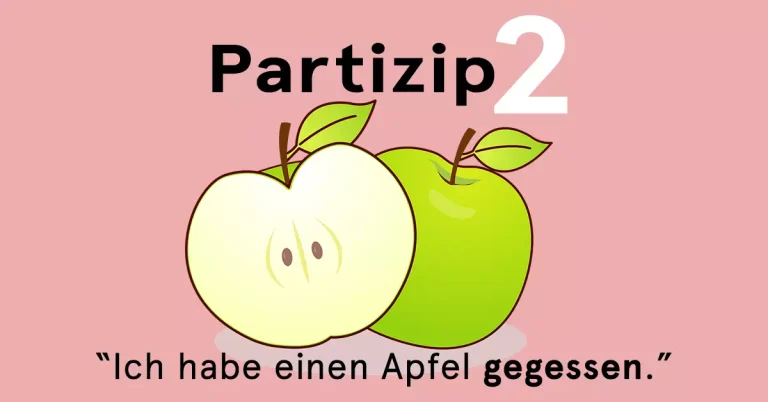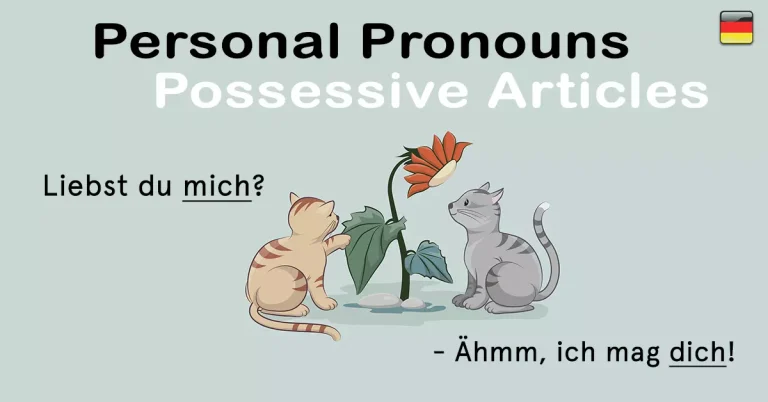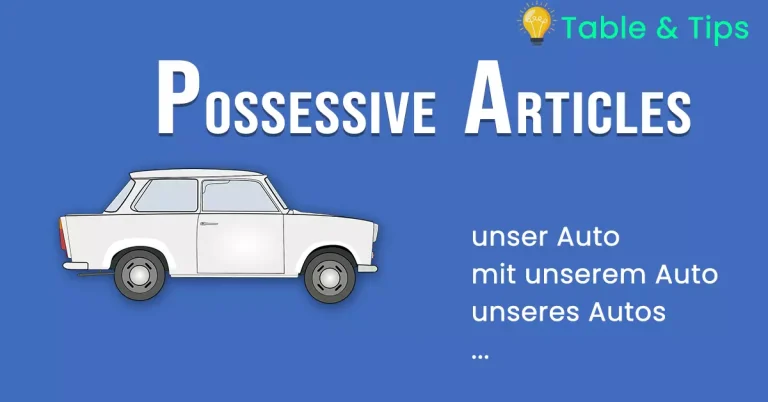In this article I will give you 5 tips (or: rules) to avoid the most common mistakes regarding the adjective endings (Adjektivdeklination). Even if you’re above the A2 level you are quite likely to make some of the these mistakes.

Table of Contents:
The Adjektivdeklination is one of the most dreaded topics in German grammar. You are definitely not alone! 🙂 I always tell my students that getting the adjective endings wrong is not the end of the world.
It is a lot more important to learn vocabulary than to memorize grammar rules anyway. At least, according to the communicative approach that has been the trend in language teaching in many countries. And I completely agree!
But it doesn’t mean that you shouldn’t care about grammar at all. And many students feel a lack of confidence when speaking German because of fundamental (A1 and A2 mistakes) even if they’re actually speaking German at a very high level regarding their vocabulary.
This article will show you five very common mistakes and how to avoid them:
1. Position of the adjective
Mistake number 1: Die Frau ist sehr *schöne. / Der *groß Mann heißt Herr Müller.
Corrections: Die Frau ist sehr schön. / Der große Mann heißt Herr Müller.
Unlike in some Romance languages you do not always need endings for the adjectives. You only need to decline (get the right ending) an adjective when it comes right before a noun (1). Frequently (but not always) we have an article (e.g. der, einen) before the adjective. This means that we often have adjective “sandwiched” between the article and the noun.
We don’t have any endings if the adjective comes after the noun or if there’s no noun at all. This can happen either with the 3 important verbs (2) sein/bleiben/werden (engl.: be, stay, become) or when we have, in fact, an adverb and not adjective (3). Adverbs give more information about verbs, not nouns. In English, they often get the ending “ly”.
(1) Der große Mann isst einen großen Apfel.
The tall man is eating a big apple.
(2) Ich bin krank und will endlich gesund werden!
I am sick and finally want to get better!
(3) Er ist schnell nach Hause gegangen.
He went home quickly.
2. Minimal ending of the Adjektivdeklination
Mistake number 2: Der *groß Mann heißt Herr Müller. / Wir haben *viel *neu Kollegen.
Corrections: Der große Mann heißt Herr Müller. / Wir haben viele neue Kollegen.
When we do have the adjective in front of the noun, we need at least the letter “e” for our ending. You can never go wrong with that!
In addition to the “e”, you might need an r,s,n or m. The right ending will depend on the gender, the case and the number (singular vs. plural) of the noun. Check other blog posts on the topic and the complete table for the Adjektivdeklination (web and PDF version)!
If you absolute no clue about which ending you have to add, then at least add an “e”. The odds that the “e” is correct (e.g. 4, 5, 6, 7 among others) are pretty high actually whereas no ending would always be wrong with an adjective in front of a noun.
(4) Der neue Nachbar ist nett. (nominative singular masculine, indefinite article)
(5) Sie ist eine tolle Frau. (nominative singular feminine, indefinite article)
(6) Das kleine Kind ist süß. (nominative singular neutral, definite article)
(7) Ich sehe schöne Häuser. (accusative plural, no article)
3. Never double “r”, “s” or “m”
Mistake number 3: der *großer Mann / das *großes Kind
Corrections: der *große Mann / das *große Kind
This article focusses on the adjective endings. It is equally important, however, to get the articles (definite: der, die, das, den, dem, des; indefinite: ein, eine …) right. This third tip is about the articles endings and the adjective endings. You will never ever get double “r”, “s” or “m”, meaning e..g. one “r” for the article and another “r” for the adjective ending. These “case signal endings” can only occur once – either in the article (8, 9, 10) OR in the adjective ending (11, 12, 13):
(8) der große Mann
(9) das kleine Kind
(10) mit einem kleinen Kind
(11) ein großer Mann
(12) ein kleines Kind
(13) mit frischem Brot (zero article)
It’s important to note that we’re talking about article + adjective here. If you use two adjectives to describe a noun (14), you can get double “r”, “s” or “m”, of course:
(14) mit leckerem, frischem Brot
Please also note that rr,ss, mm are not possible combinations, but double “n” is possible and it occurs in the accusative masculine singular (15, 16) (cf. section 4) and in the dative plural (17).
(15) Ich sehen einen großen Mann.
(16) Siehst du den großen Mann auch?
(17) Ich spreche mit den großen Kindern.
4. Accusative = Nominative
Mistake number 4: Ich sehe *einen *großer Frau. / Ich sehe ein *großen Kind.
Corrections: Ich sehe eine große Frau. / Ich sehe ein großes Kind.
If you take a look at Adjektivdeklination table and compare the most important cases for beginners, the nominative and the accusative, you notice one thing: the forms are almost identical. Of the 4 categories (masculine, feminine, neutral and plural) only the first one changes: the masculine (18)!
For the other 3, the nominative and the accusative forms are exactly the same (19, 20, 21) as you can see in my examples below with definite articles. And the same holds for adjectives in combination with the indefinite articles.
(18) Der Mann ist groß. Ich sehe den Mann.
(19) Die Frau ist groß. Ich sehe die Frau.
(20) Das Haus ist groß. Ich sehe das Haus.
(21) Die Häuser sind groß. Ich sehe die Häuser.
So, remember: accusative = nominative (except for the masculine singular forms)
5. Plural and the “n”
Mistake number 5: Die *große Kinder spielen. / *Großen Kinder finden das langweilig.
Corrections: Die großen Kinder spielen. / Große Kinder finden das langweilig.
This is VERY common mistake, as well. As we’ve seen with the masculine and the neutral singular forms, the adjective ending sometimes depends on whether we’re using an indefinite article (ein schöner Mann) or a definite article (der schöne Mann).
Similarly, in the plural (nominative and accusative) we get different adjective endings depending on the article. If there’s an article we need an “n” for the adjective (22). If there is no article, there will be no “n” either (23).
(22) die schönen Häuser
(23) schöne Häuser
Remember that there is no indefinite plural article. The plural of “ein Buch” is simply “Bücher”. In other words, the indefinite article and the “zero-article” (= no article) coincide in the plural. This means that it is very common to have no article in the plural and in such a case the adjective doesn’t get an “n” for the two most common cases, the nominative and the accusative.
Summary
I understand how tricky these small things can be at first, especially when you’re speaking rather than writing. But with little tips and tricks like these, you’ll improve over time and at some point you won’t even need these rules anymore.
Here’s a quick summary:
- Adjectives not directly in front of nouns (with sein/bleiben/werden) just like adverbs get no endings.
- Adjectives in front of nouns need to be declined (get endings). At least an “e”.
- There will never be double “r”, “s” or “m” (for the article + adjective)
- The accusative is easy. All forms are the same as the nominative, except for the masculine singular where we get a double “n”.
- In the plural (nom. and acc.): With an article the adjective gets an “n”. No article, no “n”.
Further reading: You can find all articles and all adjective forms in this article. There is also a free downloadable PDF sheet on this.
- Are you struggling with this?
- How important is it to you to get these adjective endings right?
- Or maybe you have a question on the matter? Feel free to write a comment!
Get exercises in the DMM school!
